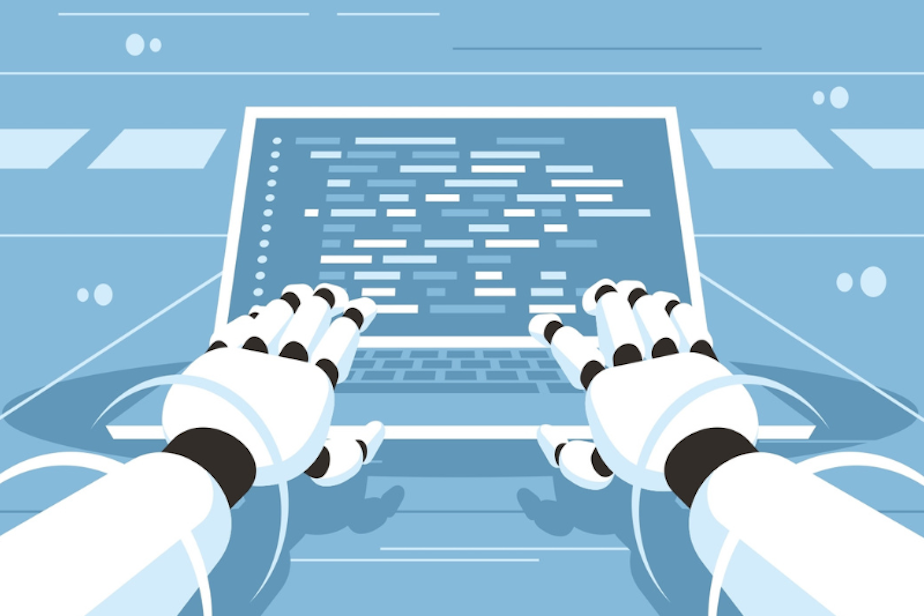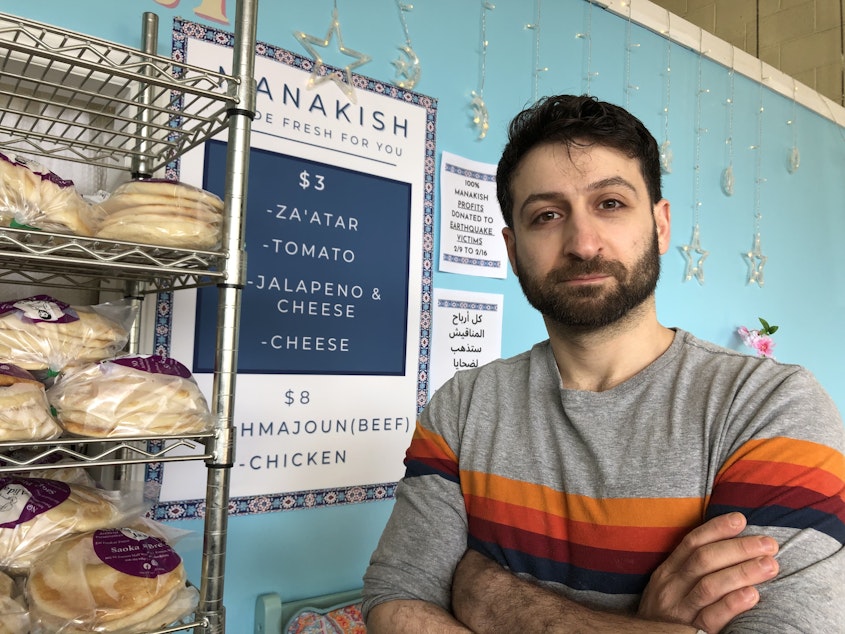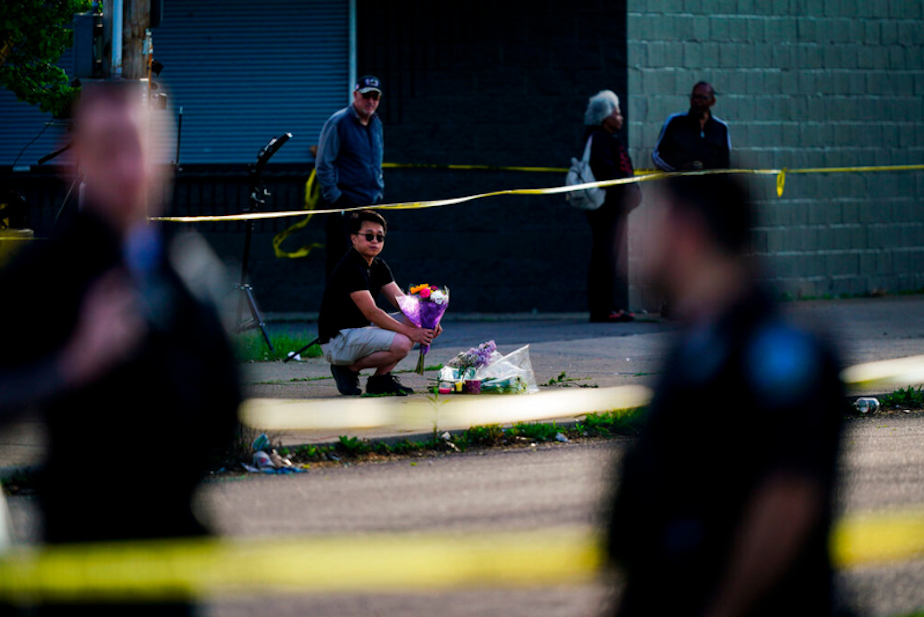Could ChatGPT write for KUOW?: Today So Far

- How well can ChatGPT write, and how concerning should it be for teachers?
- How much recess time do you think school kids are getting these days?
- After a few generations of high schoolers being pushed into college, highly paid, skilled trades are experiencing a shortage.
This post originally appeared in KUOW's Today So Far newsletter for Valentine's Day, February 15, 2023.
ChatGPT, an AI writing program, has garnered a lot of headlines and concern lately. Elon Musk argues it's further proof that AI is a threat to civilization. Some teachers see it as the next wave of technology and are teaching around it. Fox News has reported that ChatGPT has a liberal bias, because, I guess there weren't any socialists under the bed that day.
ChatGPT, basically, is a computer program that writes for you. You input a question that needs answering (like from your homework), and it cranks out a written, coherent answer. It's easy to see how educators would be concerned about students typing in homework questions, getting answers written for them, and turning that in. Beyond schools, it has some worried it could replace other work out there, like, could it write a newsletter for KUOW? More on that below.
RELATED: Google's new AI chatbot made a $100 billion mistake in a demo ad
The emerging concerns over ChatGPT prompted Seattle Public Schools to block access to the program on district computers. Students can still access ChatGPT on their own devices, however. So teachers like Kira Hopkins, who teaches high school English, starting experimenting with the program. She even tried to see if it could help create a lesson plan for her classes.
"It was quite predictable, but it did give a nice set of objectives and a nice structure," Hopkins told Seattle Now. "I immediately walked away thinking, 'Well, there's a couple interesting things in terms of what I could use. But I'm still going to use my own resources and colleagues."
Sponsored
On one level, ChatGPT is a better version of Google. Students are just as likely to type a topic into Google and hunt down an answer. ChatGPT's AI is like a shortcut. It could also be viewed as the calculator or the laptop initially were — concerning to some, but eventually adopted as routine tools. But something about this level of AI reminds me of an old article that explored whether GPS devices can influence our brains and perhaps cause a person's navigation abilities to atrophy. What could be the consequences if we hand over the exercise of original, critical thinking?
Hopkins explained that teachers are certainly wary of the writing program. She has even encountered some student work where she wasn't sure if it was original or ChatGPT.
She notes that there are some AI detectors out there that teachers can use, but they aren't perfect. Ultimately, Hopkins says that programs like ChatGPT may be useful in some regards, but teachers need to be watchful. She also points out that modern students have grown up with technology. It's part of how they operate with everyday life.
"I think (students) are aware of what the tool can do for them. I think they are aware of what the ethical ramifications of how it can be used to get out of their work ... but I really do think that students want to learn. I really do think they have a genuine desire to improve their writing and improve their learning."
RELATED: This 22-year-old is trying to save us from ChatGPT before it changes writing forever
Sponsored
Taking a cue from Hopkins, I gave ChatGPT a try and instructed it: "Write me a newsletter based on KUOW's reporting today." It didn't go well.
ChatGPT did write a newsletter for me. It included statements like "Seattle's NPR news station" and ended with "Thank you for reading today's newsletter. To stay up-to-date on the latest news and analysis from KUOW, be sure to visit their website or tune in to 94.9 FM." I admit, that is impressive information for a computer to create. The content of the newsletter, however, wasn't so impressive. It began with an update on the Covid-19 pandemic and said King County would soon begin offering vaccines to ages 65 and older (that information is likely from 2021). It then pointed to reporting from Joshua McNichols, which as best as I can tell, was from 2016. It finished with an education story from Ann Dornfeld, which also wasn't recent.
Not only that, but its newsletter never made any pop culture references or mentioned Michael Bolton's sultry saxophone voice (which TSF readers appreciate, I'm sure). OK, so maybe asking ChatGPT to do my job was a little too nuanced. So I followed up and asked it: "Who is the best Star Trek captain?"
Its response: "As an artificial intelligence language model, I don't have personal opinions or preferences. However, the Star Trek franchise has featured several iconic captains throughout its various series, and each has their own unique strengths and leadership styles that make them beloved by fans."
ChatGPT then listed Kirk, Picard, Sisko, and Janeway (the order they appeared on TV), listing off their unique attributes and leadership styles. It then closed by stating: "Each captain has their own strengths, weaknesses, and distinctive personality, and ultimately, the 'best' captain is a matter of personal preference."
Sponsored
This is where teachers (and the rest of society) could have a problem. Aside from the fact that the answer is clearly Captain Picard, ChatGPT appeared to have produced an original, critical thought, even if it was a light one: That the "best" captain is relative to individual fans. This could have come from the AI searching the internet, or it could have come from the programmer, but it was nuanced and original.
Schools are supposed to teach basics like math and reading, but beyond that, one would hope that students come away with the ability to think. They not only can read "Moby-Dick" but critically examine the tale to understand the dangers of obsession and pride, and that while the pursuit of knowledge is noble, it must be tempered by humility (this assessment is also an answer I got from ChatGPT). And further, they can use such critical thinking skills to navigate real life challenges. Some of this critical thinking can come from school, and some, hopefully, from home and life. But if the exercise is removed, and the work is done for them, that could have serious ramifications for future minds.
RELATED: Microsoft revamps Bing search engine to use artificial intelligence
Check out Seattle Now's full conversation with Hopkins about ChatGPT here.
How much recess time do you think school kids are getting these days? I would have assumed at least an hour. Apparently not. There's a bill under consideration in Olympia right now that would require 45 minutes of recess for elementary students. In King County, recess times vary from school-to-school, ranging from just 10 minutes a day, to 50 minutes. Read more here.
Sponsored
When I look back at the guidance I got in high school, part of me can't help but think of the bad advice that I got. It's not the fault of teachers, or family, or others from older generations who repeatedly pressed that college was a fast-track to a good life. Pushing a college degree was good advice...when they were in high school. I recall hearing from a teacher that this computer coding thing was slated to produce big paychecks and there were training programs for it. When I ran that by another adult, the response was, "Yeah right. That's more than I make and I have a college degree!"
I thought of that after reading an updated report from NPR. After a few generations of high schoolers being pushed into college, highly paid, skilled trades are experiencing a shortage. These jobs don't require college degrees. NPR reported on this issue back in 2018 and just re-reported the story with updated data for 2023 while profiling the folks building our region up these days — such as the Rainier Square Tower in Seattle and a data center for Microsoft.
It's not that college has no value, but the logic of it being the gold standard of post-high-school options is starting to wear. And if that still sounds a bit odd and counterintuitive, just ask yourself how quick and easy it would be for you to get a plumber out to your place these days, and how high the check would eventually be.
AS SEEN ON KUOW

Sponsored
Nechirvan Zebari, owner of Alida's Bakery in Everett, specializes in Middle Eastern breads. Local relief efforts continue to help Turkish victims after one of the deadliest earthquakes in that country’s history. But for this Everett baker, the tragic event struck a personal chord. (Ruby de Luna / KUOW)
DID YOU KNOW?
We've heard a lot about balloons being shot down over the United States and Canada lately, from spy balloons to UFOs. What partially prompted concern about these objects is that nobody knew where they came from, unlike the hundreds of balloons launched in the US each day.
The National Weather Service launches about 184 balloons, daily, at various sites across the nation. These balloons are often launched at airports, and therefore, weather service officials are notifying FAA towers and sharing their location with aviation authorities. The balloons carry instruments that are used to measure winds and other aspects of the weather. They're pretty small and are about the size of a large bird. The balloons eventually pop. The instruments then release a parachute and fall to the ground. This system is a big part of how the NWS makes weather forecasts.
The weather service launches other balloons that go even higher and measure other aspects of the atmosphere. NASA also launches its own measurement balloons. Globally, about 900 sites are launching such forecasting balloons. Read more here.
ALSO ON OUR MINDS

The Buffalo Tops shooter has been sentenced to life in prison without parole
The 19-year-old white gunman who killed 10 Black people and injured three others at a grocery store in Buffalo, N.Y., last year has been sentenced to life in prison without the possibility of parole.

